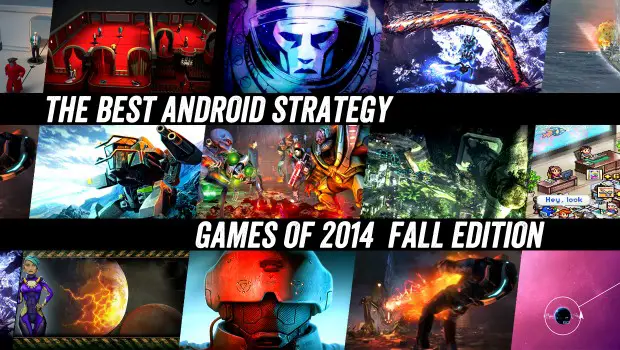
The Best Android Strategy Games of 2014 (Fall Edition)
2014 has proven to be quite bountiful year for Android strategy fans. Quality titles are more common than ever. Some excellent PC games have received impressively faithful ports, while more games developed specifically for mobile devices are rivaling their PC cousins in depth and complexity. In celebration of this bounty, happy to bring you this list of the best Android strategy games to have come out so far this year.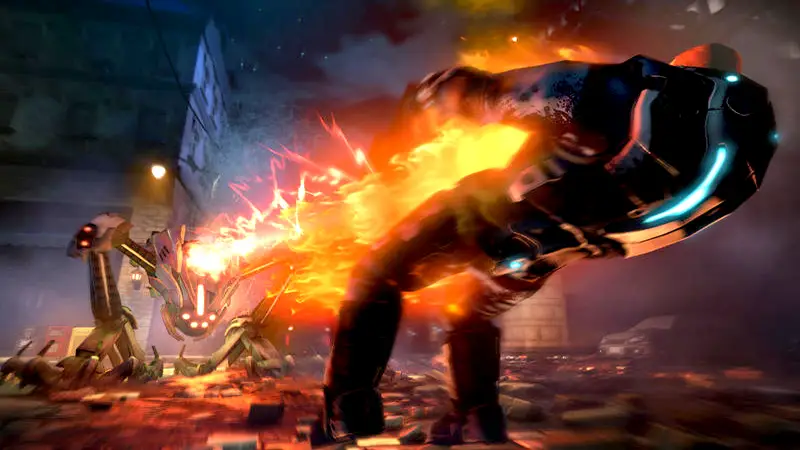
XCOM: Enemy Unknown
Speaking of PC ports, there’s this. Mobile versions of big-budget console and PC games can be an iffy proposition, so it’s nice to see it done well, especially with so venerable a franchise. This is a full-blown port of Firaxis’ 2012 remake of the classic franchise, with all its complexity and depth intact. Just like the big-screen version, you manage an international organization dedicated to defending earth from alien invasion, shoot down UFOs, research captured technologies, and command squads of soldiers in turn-based tactical battles that can go disastrously and/or hilariously wrong if you’re not careful.
The presentation is likewise impressive. The graphics are quite nice, albeit not on the level of the home version, it includes all the voices of the original, too, so Dr. Vanten’s nagging about how she can’t get research materials because you keep blowing everything up can follow you wherever you go. It’s $10, which is pricey for a mobile game but quite reasonable for what you get here.
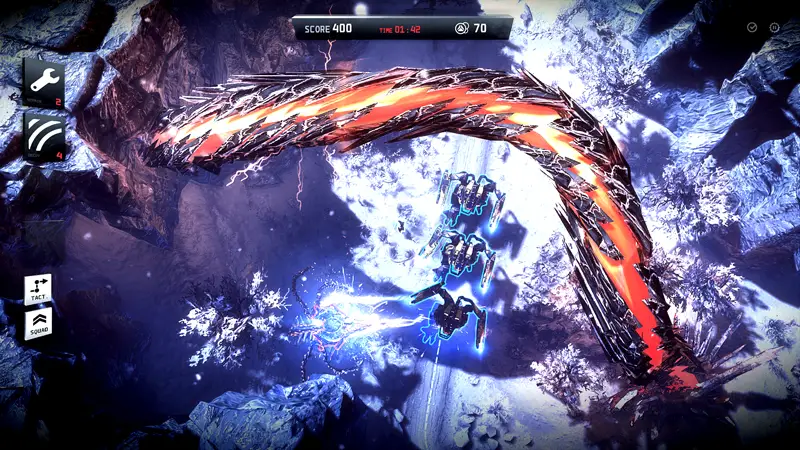
Anomaly 2
Somewhere on the PC-to-mobile spectrum between the high-profile, big-budget XCOM remake and obscure strategy games that look like they were made a quarter-century ago lies Anomaly 2 from Poland-based 11bit Studios. The original Anomaly: Warzone Earth got an excellent Android port, and happily the same is true for Anomaly 2.
The Anomaly series is often described as “tower offense:” you assemble an attacking force and blast your way through a gauntlet of stationary enemy defenses, upgrading your forces, adjusting your route, and deploying a limited supply of special abilities like repairs, decoys, and air strikes along the way. It’s great fun, combining a lot of planning as you choose your route and units with careful timing as you decide the right moment to unleash your abilities. Plus lots and lots of stuff blowing up.
Anomaly 2 expand moves the story ahead a few decades, from the beginning of an alien invasion of present-day Earth to a devastated future where humans fight a desperate war against an enemy that now dominates most of the planet. All your vehicles are new, and many have the ability to transform into different forms with advantages in different situations. The gameplay makes the transition to touch controls quite well, and the graphics are very impressive for a mobile game. The voice acting from the PC version all makes the transition as well- though sadly your CO from the first game, Brigadier Jason Statham Impersonator, is no longer giving the mission briefings.
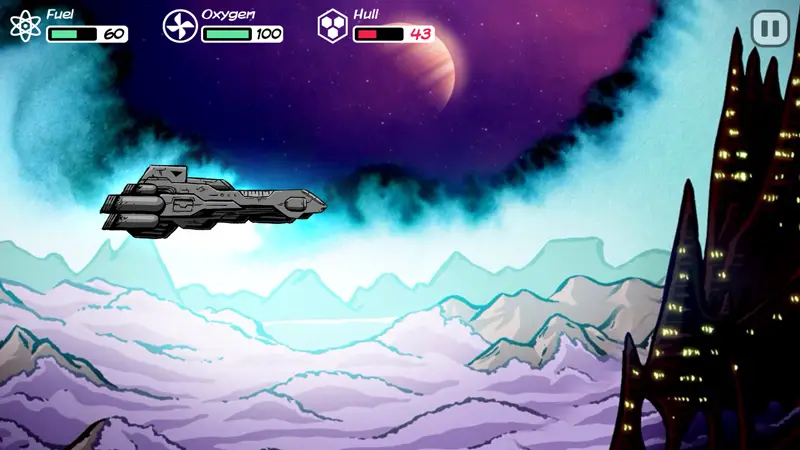
Out There
Space is terrifying. It’s dark. It’s lonely. Your survival from one moment to the next is dependent on the continuous functioning of complex technologies that are the only thing standing between you and a variety of horrible deaths. It’s an incomprehensibly vast gulf of nothingness that’s trying to kill you, occasionally broken up by islands of matter that are also usually trying to kill you.
Out There understands this.
Out There casts you as the pilot and sole crew member of a spaceship lost far from Earth. You chart a course is from solar system to solar system and make decisions during story events and random encounters, while gathering resources to keep yourself going, finding new technologies, discovering weird alien artifacts, and encountering aliens themselves. The language of the aliens is initially incomprehensible and becomes translatable bit by bit over time through repeated encounters, which is cool.
Solar systems and events are randomly generated each game. Gameplay is about trade-offs, often desperate ones made on the edge of survival. This can produce some great tension as you jump from system to system looking for a life-bearing planet to replenish your diminishing life-support, or contemplate whether to risk damage to your ship harvesting fuel from the atmosphere of a turbulent gas giant, or are forced to decide whether you can spare the resources it will take mining for metals to repair a damaged ship.
The game has excellent atmosphere, with the gameplay bolstered by some great music, a surprisingly deep story and setting. a lot of cool events, random encounters, and plot developments, some of which are genuinely creepy and unsettling, and narration that drives home just how alone the game’s protagonist is. If you enjoy challenging games with randomly generated worlds or want a game that uses science fiction as something more more than a colorful backdrop for blowing things up, check this one out.
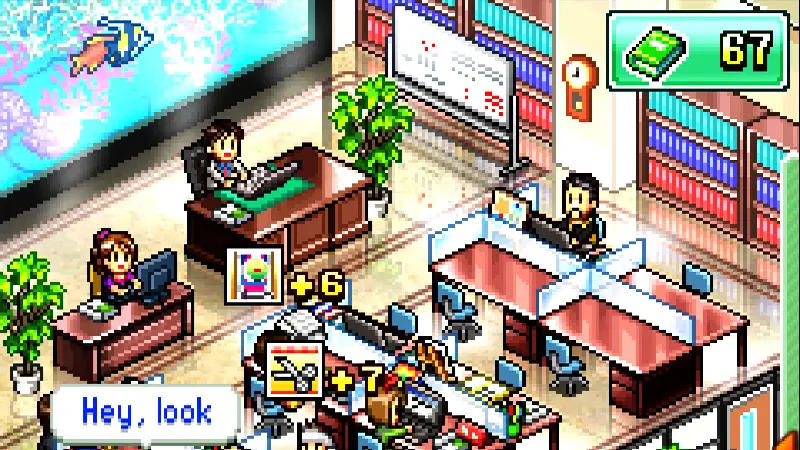
Magazine Mogul
On a more upbeat note there’s magazine mogul, the most recent business sim from Kairosoft. Their releases aren’t coming out as frequently as they used to, presumably because they’ve mostly worked through their backlog of older, previously untranslated games, so I’m always happy to see a new one arrive.
This time, you’re in charge of a local magazine in a small town, and it’s up to you to plan articles, hire and train personnel, seek out new locations and angles for stories, and make your magazine more popular with readers and advertisers. The most directly comparable previous Kairosoft game is Game Dev Story- the personnel management mechanics are very similar, and the process of creating new magazine issues is similar to the way game development worked in Game Dev Story. There’s still plenty of differences, though, including some light town management elements where you gain a seat on the city council and can propose projects to further develop the town.
It’s a Kairosoft game through and through: cute pixel art, silly humor, quite a bit of complexity and depth under the goofy exterior, and a cheerful, upbeat atmosphere that’s incredibly infectious. How you’ve felt about past Kairosoft games is probably a pretty solid indicator of how you’ll feel about this one. I love it, personally, despite (or perhaps because of) my own sensibilities normally being much further towards the “incomprehensibly vast gulf of nothingness that’s trying to kill you” end of the scale. I highly recommend it, as I do Kairosoft’s games in general.
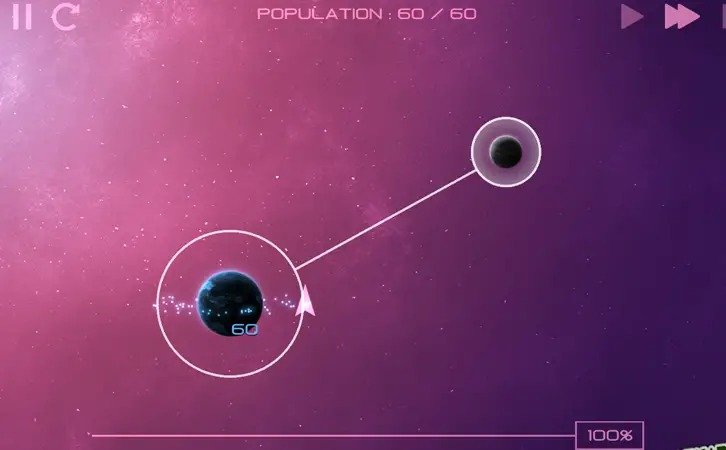
Solarmax 2
Solarmax 2 is an interstellar warfare strategy game of sorts. I say “of sorts” because it’s very abstract- there’s no setting or story to speak of, and ships are just fungible little dots battling over control of planets spread across each stage with no particular resemblance to any sort of actual solar system.
It’s a lot of fun, though, with battles that are fast-paced but still have a lot of scope for tactics, swarms of ships that can number in the hundreds clashing and exploding in showers of tiny sparks, beautiful backgrounds, and some great music and sound. In later stages, where there are more than two factions on the map, planets get more numerous and sometimes move around the map, fleet sizes get bigger, and things like space stations (which shoot at passing enemy ships) and jump gates come into play, things can get absolutely insane, yet the games never becomes unmanageable.
(For an alert human player, anyway. A mobile device without a reasonably beefy CPU may be a different matter—don’t let the fact that it only requires Android 2.2 fool you.)
It’s kind of short, and if you go into this expecting a 4X game along the lines of the lines of Master of Orion you’re going to be greatly disappointed, but it’s highly recommended nevertheless.
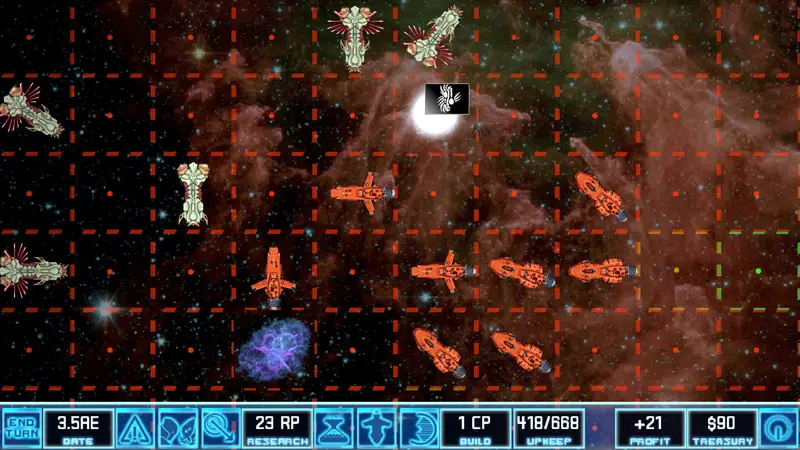
Star Traders 4X Empires
This is where you should be looking if you want a 4X game along the lines of Master of Orion. Star Traders 4X Empires is a game by the Trese Brothers, a name you should become acquainted with if you’re interested in serious strategy games and RPGs for mobile devices. As the name suggests, it’s a 4X interstellar empire game set in the universe of their science fiction RPG Star Trader.
(As well as the very cool Templar Assault, where you lead a squad of power armor-clad warrior fanatics who are absolutely Not Warhammer 40K Space Marines battling hostile aliens that are absolutely Not Tyranids in the dark, claustrophobic confines of something that is clearly Not A Space Hulk. If you like turn-based infantry tactics, get it; it’s great. There’s even a free version.)
If you’re familiar with 4X games, you’ll have an idea of what to expect- colonize new worlds and oversee their development, manage your empire’s internal affairs, fight or treat with rival empires, build fleets of warships to do battle. It’s not an especially groundbreaking entry in its genre, but it’s a solid one- and the fact that it actually is a full-fledged interstellar empire strategy game made for mobile devices, with depth and complexity comparable to its PC cousins, is very impressive indeed.
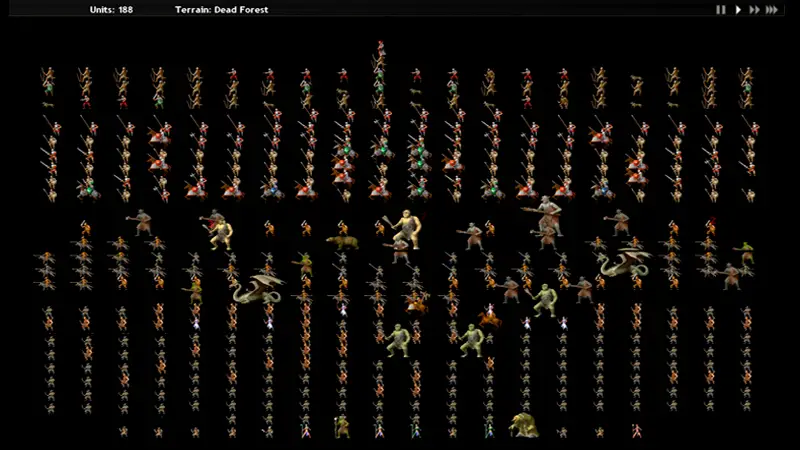
Conquest of Elysium 3
This is a straight port of the PC game of the same name, where you take command of one of 18 different factions and battle to rule the fantasy land of Elysium. You build units, harvest resources (of which there are many, often faction-specific), and seize control of valuable locations, which range from towns, mines, and forts to more exotic places like ruins, old battlefields, (handy for raising the undead), libraries, and gallows.
Variety is the name of the game here. Every faction and its leader has distinct abilities and units, and they play very differently. Dwarves can craft powerful weapons and armor to upgrade their units with the metal and gems they mine, the Necromancer raises up undead hordes from battlefields and cemeteries, the Priest-King can perform human sacrifices—up to and including entire towns—to invoke the blessings of his bloodthirsty deity, and the Voice of El gain benefits from converting towns to their religion and finding holy relics. Then there’s the Baron, the Senator, the Enchanter, the Daemonologist, the race of subterranean cyclopes, and so forth.
There are a huge number of units, some faction-specific and others more widely available, which are highly diverse in their stats, abilities, and battlefield functions. You’ve got pikemen, spearmen, swordsmen, archers, halberdiers, cavalry, faction-specific alternate versions of many infantry units (barbarians, demon-worshiping cultists, halflings, goblins, etc.) a bunch of Roman Empire-inspired infantry types, druids, different types of wizards specializing in one of 45 magic types, knights, siege engines, various summoned demons, necromancers, zombies, wild animals, ogres, giants, huge magical constructs, Lovecraftian fish-men… The list goes on.
The battle system is quite complexity and in-depth. Battles play out automatically once armies meet, though in this case that’s probably for the best- victory and defeat largely hinge on the strength and composition of your forces, and directing every individual attack yourself would get very tedious for very little return. They’re fun to watch, though.
The graphics are rudimentary. The animations can only dream of one day rising to so lofty a level as “rudimentary.”I love it. It’s enormously fun and addicting, very deep, and the different factions make for radically different experiences. If I were to recommend just one 2014 strategy release on Android, it would be this one.
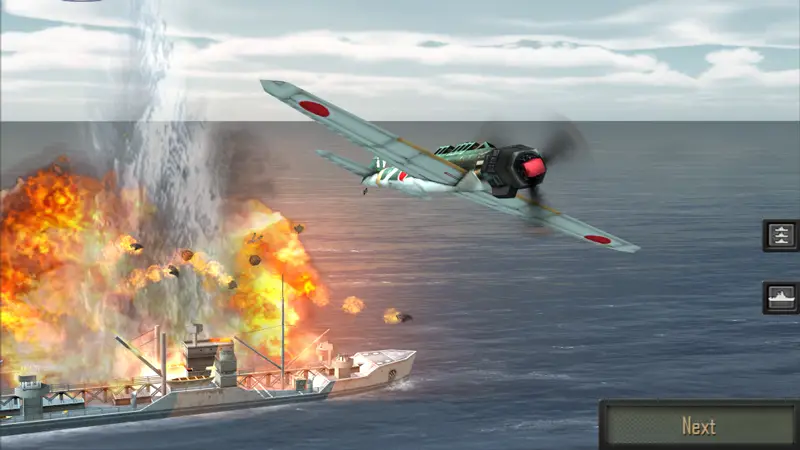
Pacific Fleet
Pacific Fleet is a naval combat game set in the Pacific theater of the second world war, combining turn-based tactics with an unusual amount of “hands-on” aspects. You aim ships guns yourself, setting the direction and angle of each shot, and movement controlled by setting your ships’ engine power and rudder angle instead of of simply designating a destination.
It’s something of a mixed bag. The game initially gives the impression of being more realistic and historical than it actually is. It doesn’t seem sure of what it wants to be. At first the game sacrifices playability for realism, turning the first few campaign missions into a frustrating exercise in patience—and almost immediately discards that historical realism with a thoroughly unhistorical upgrade system leaving me wondering what the point of the half-hearted stab at accuracy was.
So why is it on this list? Simple. Once you slog through the first few missions, the game is tons of fun. It models ship damage in impressive detail, with damage applied based on where your shells actually land. Damage below the waterline causes flooding, and the game actually tracks which parts of a ship are flooding and the water’s progression over time. Ships can catch list, capsize, slowly sink, catch on fire,and suffer catastrophic magazine and boiler room explosions. There’s lots of different ships to unlock, from subs destroyers to battleships and carriers, and there’s tremendous visceral satisfaction in watching a big broadside slam into an enemy ship and seeing the devastation you’ve caused. It’s worth playing despite its initial missteps.

Hitman GO
Porting a big-budget stealth/action game to mobile devices with their much lower computing power and the reduced precision of touchscreen controls, is an iffy proposition. So, wisely, the developers of this mobile entry into the Hitman franchise doesn’t even try. Instead, Hitman GO abandons the series’ third-person action roots in entirely in favor of a turn-based strategy/puzzle approach. You control Agent 47 through a series of stages, one grid square at a time, avoiding or eliminating guards as you make your way to your assassination target and then make your escape.
It’s a drastic shift, but it actually works. Fans of the older games in the series may even find its focus on stealth and the puzzle game-like process of figuring out a level refreshing, after the most recent big-screen Hitman game’s increased emphasis on straight-up action. It would be nice to see more developer’s of mobile spin-offs of AAA games take a lesson from this one, recognizing and working with the limitations of their platform without using them as an excuse to make a cheap cash-in.